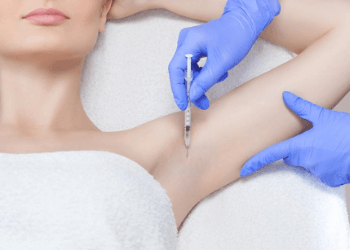Excessive sweating: it might not seem like the nicest of subjects, but according to figures from Hyperhidrosis UK, around 1% – that’s over 678,000 people – live with the condition in the UK alone. Sadly, many suffer in silence, not realising that there are thing that can be done to help manage and relieve the condition, leaving you to focus on what’s important – everything else!
We know that excessive sweating can be as problematic to talk about it as it is to live with. That’s why we want to make it easy to talk to us at our Inverness skin clinic, with so many ways to get in touch, and a consultation to chat to you about any hyperhidrosis treatment you have with us ahead of booking.
So, without further ado, read on for our 5 ways to help with hyperhidrosis.
Shake up your skincare
Unsurprisingly, what you put on your skin can affect your levels of sweat production. Lots of hyperhidrosis sufferers think that frequent washing can help solve the problem, when it actually makes their excessive sweating worse – and those who want to cover up the signs with sprays and other perfumes can end up aggravating their skin, too.
One way to help solve hyperhidrosis under the arms could be to switch to an antiperspirant, which prevents the glands there from producing too much sweat (a typical deodorant just targets the smell). Also, avoid soap-based cleansing products.
Welcome in a new wardrobe
Sometimes, the clothes you wear can actually exacerbate your excessive sweating – or at the very least, draw attention to it.
* Colours – black and white are often touted as the best shades to wear, as they make sweat patches appear less noticeable.
* Fit – the tighter the clothing, the more likely it is to make you hot, and to show patches. Loose clothing is the way to go.
* Fabric – cotton and wool are ideal choices; cotton is known for being breathable, while wool has moisture-wicking properties. Synthetic fabrics can sometimes make your problem worse.
* Style – some manufactures make specialist garments with absorbent pads to soak up any extra sweat.
* Footwear – for sufferers who experience the problem in the soles of their feet, change your footwear out each day and be sure to wear socks!
You are what you eat?
What we put into our bodies can have an effect on our skin. These foods and drinks are known to have a negative effect on excessive sweating:
* Sugar – a high-sugar meal can cause an increase in insulin production, which can cause your blood sugar to drop and prompt sweating.
* Spice – spicy foods can trick your body into thinking it’s physically hot, triggering sweat production to cool it down.
* Hot foods – as above, these can raise your body temperature.
* Caffeine – this stimulant ‘activates’ your sweat glands.
* Alcohol – for those who drink alcohol excessively, alcohol can trigger night sweats.
* Meat (especially processed meats) – you’ve probably heard of ‘the meat sweats’. It’s thought that this phenomenon is caused by an increase in protein, which may need more energy to break down.
Book with us
To get a handle on your hyperhidrosis, get in touch with our Inverness skin clinic today. We can offer more guidance on how to manage the condition, and can suggest treatments too. To enquire, please get in touch with our friendly team now!


